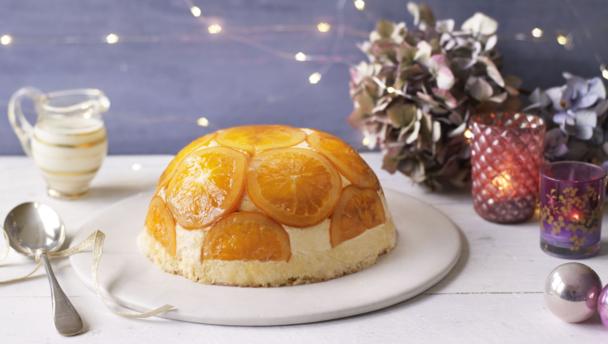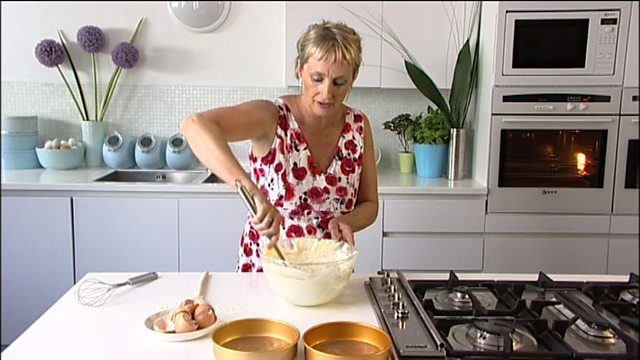
A genoise sponge base is soaked in Grand Marnier and topped with oodles of custard and candied orange slices.
For this recipe you will need a 23cm/9in springform tin, an electric mixer and a 2 litre/3½ pint bowl or a deep 23cm/9in diameter pie dish.

Using a mandoline or a very sharp knife, slice the orange very thinly (about 2mm thick). Remove any pips. Tip the sugar and 400ml/14fl oz water into a large pan and bring to the boil stirring until the sugar has dissolved. Add the orange slices and bring to the boil. Reduce the heat, cover and simmer over a very low heat for 2 hours. Remove from the heat and leave to cool. Drain the oranges reserving the sugar syrup.
Mix 100ml/3½fl oz of the reserved sugar syrup with the Grand Marnier and set aside. Reserve any remaining sugar syrup for glazing.
For the crème pâtissière, measure the milk into a medium pan and add the vanilla paste. Bring to just below boiling point.
In a bowl, whisk the eggs, sugar and flour together. Pour the hot milk over the egg mixture, whisking continuously. Return the mixture to the pan, then cook over a low heat, stirring continuously, until thickened. Pour into a clean bowl and cover the surface with cling film. Leave to cool then chill in the fridge until set.
When the crème pâtissière is set, whip the cream until soft peaks form when the whisk is removed. Whisk the cooled crème pâtissière until smooth, then fold in the cream.
For the genoise, preheat the oven to 180C/160C Fan/Gas 4. Grease a 23cm/9in springform tin with butter and line the base with baking parchment.
Gently melt the butter in a small pan and set aside to cool slightly. Measure the eggs and sugar into a large bowl. Whisk at a high speed, using an electric mixer, until the mixture is pale, mousse-like and thick enough to leave a trail when the whisk is lifted from the mixture (known as the ribbon stage).
Carefully fold half the flour into the egg mixture then gently pour half the cooled butter around the edge of the mixture and fold in until incorporated. Repeat with the remaining flour and butter. Pour the mixture into the prepared tin.
Bake for 25-30 minutes or until well risen and the top of the cake springs back when lightly pressed with a finger. Leave to cool in the tin for a few minutes then turn out, peel off the parchment and finish cooling on a wire rack.
To assemble, line a 2 litre/3½ pint bowl or a deep 23cm/9in diameter pie dish with a double layer of cling film.
Slice the cooled genoise horizontally, so you have 2 sponges. Trim one of the sponges to an 18cm/7in circle, using a plate or a cake tin as a guide.
Arrange the orange slices inside the cling film lined bowl. Place one slice in the centre and arrange 6 slices in a circle around the central slice. Cut 3 orange slices in half and use the 6 halves to fill the spaces left between the 6 round slices.
Spoon half of the crème pâtissière into the bowl and gently smooth it over the oranges and up the sides to cover. Place the 18cm/7in sponge on top and brush with half of the Grand Marnier syrup.
Finely chop the remaining orange slices and fold through the remaining crème pâtissière. Spread the mixture over the soaked sponge. Top with the remaining sponge and brush with the remaining Grand Marnier syrup.
Cover with a sheet of baking parchment and place a 20cm/8in plate or cake tin base on top and press down gently. Chill for at least 6 hours, preferably overnight.
To serve, remove the baking paper and invert the bowl onto a serving plate to turn out the rosace à l’orange. Remove the cling film and brush the oranges with the reserved sugar syrup to glaze.
The cake can be made up to 2 days ahead. Make up to step 12 and store in the fridge.

You need JavaScript to view this clip.
Recipes from this episode